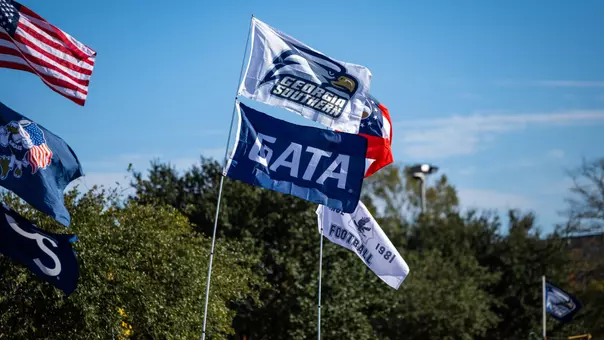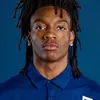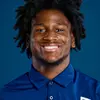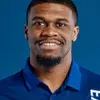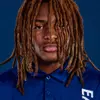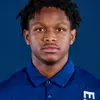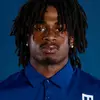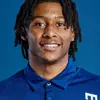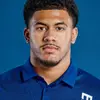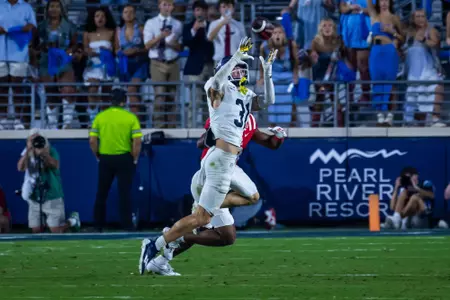
Position Previews: The Defensive Backs
6/30/2025 2:30:00 PM | Football
Chatting with Darius Safford about his position group
As the dog days of summer roll on, GSEagles.com is sitting down with each of the 11 position coaches to discuss their room. Up first is defensive backs coach Darius Safford, who oversees the corners and nickels.
Q: Coach, what were your overall takeaways from spring ball for your defensive backs?
DS: I thought the group performed exceptionally well. The biggest difference in year two is familiarity—with the scheme, the expectations, and the standard. Guys are playing faster and more freely, and now they can really start to dissect formations, route splits, and pre-snap indicators.
What stood out most was their ability to bounce back. Whether it was a tough rep or an off day, they responded the right way. In this group, you've got to have short-term memory and mental toughness. I thought we showed both over all 15 practices.
Q: You've got some veteran corners back. Who stood out this spring?
DS: Our top three corners—Tracy Hill Jr., Chance Gamble, and Dorrian Smith—played at a high level. But for me, the focus is always consistency. I have high standards, and low expectations can't survive high standards. These guys know that.
Dorrian had a huge interception against Coastal Carolina last year, and I'm challenging him now—let's not get tackled inside the 5, let's score six. Chance made some great plays, but we left some out there too—like a potential pick-six at Nevada or a post ball early at Georgia State. Tracy had a PBU against Boise State that I now use as a teaching clip. I want that PBU to become an interception next time.
What I appreciate most is how they carry themselves on and off the field. They do the work in the classroom and in the weight room, and that bleeds over to the younger guys. They set the tone every day.
Q: Speaking of younger guys, who's in that next group ready to step up?
DS: That's a big part of this year—developing the next wave behind our veteran core. It's not easy. A lot of these guys were "the man" in high school, and now they have to wait behind older players. That can be tough, especially when you redshirt.
Two guys I'm really proud of: Elijah McDowell and Jaquari Brown. They've worked their tails off, and they've been consistent since December. Elijah was sending me workout clips over Christmas break. They've embraced the grind and are learning from the vets. I wouldn't be surprised at all if one or both of them make an impact this fall.
Q: Who are your leaders in the room?
DS: I call them the Three Horsemen—Tracy, Chance, and Dorrian. Each one leads in a different way. Tracy is a communicator—he looks out for the whole group and acts as a bridge between me and the players. Chance has been with me since 2021. He knows what it should look like and isn't afraid to speak up when we need to flip the switch. Dorrian is more reserved, but when he talks, everyone listens. He has that JUCO background and played great ball at Peach County, so he knows what it takes to win and sustain success. Together, they balance each other really well. I'm grateful to have them.
Q: What are some of the position battles you're excited to see this preseason?
DS: I like to mix it up in camp. We've got those three starters returning, but I'll throw a younger guy in with the ones to see how he handles it. The communication is different when you're on the field with veterans—you play with more confidence when you're next to guys like Brendan Harrington or Brandon Tyson.
I want to create an environment where everyone prepares like a starter. You never know when your name's going to be called. Last season, Mark Stampley played all three positions. Caimon Mathis stepped in during the App State game when Tracy and Chance went down. If you're not ready for the moment, it can be too big. We're aiming for a 13+ game season—Sun Belt Championship and beyond—so we've got to be ready to roll guys in and out without a drop-off.
Q: Let's talk about the nickel spot. Ayden Jackson returns as your starter. What's his role in this group and how does it look behind him?
DS: Ayden's an ultra-competitive player. One of our biggest focuses with him has been channeling that energy—he's so hard on himself sometimes that it can get in the way of taking the next step. But he's grown a ton, and he sets the tone from an effort and energy standpoint. The nickel is the most demanding spot in our defense. You've got to cover in man, play half-field zones, and fit the run inside. It's a lot to ask. Ayden's football IQ and competitive nature make him a perfect fit. He's the kind of player who can be all-conference if he keeps building. He's come a long way since the bowl game, and I'm excited to see him elevate.
Behind him, I'm looking forward to seeing more of Phillip Gladney and Carlo Thompson. Phillip is a young guy who came along during spring and Carlo is a transfer who missed the spring but has real potential.
Q: Finally, what's the top thing you'll be preaching to your group to help this team win?
DS: One word: consistency. These guys have done a great job taking coaching and working every day since February. Now it has to translate to Saturdays. We play in a great league. You can't just show up once or twice a year. You've got to bring it every week. That starts with mindset. If we approach every week the right way—through preparation, film, and focus—we'll be in a great place.
We've got to hold up on the perimeter. College football is about vertical shots, and if we can disrupt timing and force quarterbacks off schedule, that's huge. Our defensive mantra is "Put the ball down." No matter what happens—explosive play, turnover, bad call—we take the field with urgency and get the stop.
We've got to eliminate explosive plays and create takeaways. We talk about turning PBUs into interceptions. We dropped one in the bowl game that could've been a difference-maker. If we're going to take the next step, we've got to make those plays—especially late in games. When the pressure's on, we want the ball coming our way. We're built for that.
Q: Coach, what were your overall takeaways from spring ball for your defensive backs?
DS: I thought the group performed exceptionally well. The biggest difference in year two is familiarity—with the scheme, the expectations, and the standard. Guys are playing faster and more freely, and now they can really start to dissect formations, route splits, and pre-snap indicators.
What stood out most was their ability to bounce back. Whether it was a tough rep or an off day, they responded the right way. In this group, you've got to have short-term memory and mental toughness. I thought we showed both over all 15 practices.
Q: You've got some veteran corners back. Who stood out this spring?
DS: Our top three corners—Tracy Hill Jr., Chance Gamble, and Dorrian Smith—played at a high level. But for me, the focus is always consistency. I have high standards, and low expectations can't survive high standards. These guys know that.
Dorrian had a huge interception against Coastal Carolina last year, and I'm challenging him now—let's not get tackled inside the 5, let's score six. Chance made some great plays, but we left some out there too—like a potential pick-six at Nevada or a post ball early at Georgia State. Tracy had a PBU against Boise State that I now use as a teaching clip. I want that PBU to become an interception next time.
What I appreciate most is how they carry themselves on and off the field. They do the work in the classroom and in the weight room, and that bleeds over to the younger guys. They set the tone every day.
Q: Speaking of younger guys, who's in that next group ready to step up?
DS: That's a big part of this year—developing the next wave behind our veteran core. It's not easy. A lot of these guys were "the man" in high school, and now they have to wait behind older players. That can be tough, especially when you redshirt.
Two guys I'm really proud of: Elijah McDowell and Jaquari Brown. They've worked their tails off, and they've been consistent since December. Elijah was sending me workout clips over Christmas break. They've embraced the grind and are learning from the vets. I wouldn't be surprised at all if one or both of them make an impact this fall.
Q: Who are your leaders in the room?
DS: I call them the Three Horsemen—Tracy, Chance, and Dorrian. Each one leads in a different way. Tracy is a communicator—he looks out for the whole group and acts as a bridge between me and the players. Chance has been with me since 2021. He knows what it should look like and isn't afraid to speak up when we need to flip the switch. Dorrian is more reserved, but when he talks, everyone listens. He has that JUCO background and played great ball at Peach County, so he knows what it takes to win and sustain success. Together, they balance each other really well. I'm grateful to have them.
Q: What are some of the position battles you're excited to see this preseason?
DS: I like to mix it up in camp. We've got those three starters returning, but I'll throw a younger guy in with the ones to see how he handles it. The communication is different when you're on the field with veterans—you play with more confidence when you're next to guys like Brendan Harrington or Brandon Tyson.
I want to create an environment where everyone prepares like a starter. You never know when your name's going to be called. Last season, Mark Stampley played all three positions. Caimon Mathis stepped in during the App State game when Tracy and Chance went down. If you're not ready for the moment, it can be too big. We're aiming for a 13+ game season—Sun Belt Championship and beyond—so we've got to be ready to roll guys in and out without a drop-off.
Q: Let's talk about the nickel spot. Ayden Jackson returns as your starter. What's his role in this group and how does it look behind him?
DS: Ayden's an ultra-competitive player. One of our biggest focuses with him has been channeling that energy—he's so hard on himself sometimes that it can get in the way of taking the next step. But he's grown a ton, and he sets the tone from an effort and energy standpoint. The nickel is the most demanding spot in our defense. You've got to cover in man, play half-field zones, and fit the run inside. It's a lot to ask. Ayden's football IQ and competitive nature make him a perfect fit. He's the kind of player who can be all-conference if he keeps building. He's come a long way since the bowl game, and I'm excited to see him elevate.
Behind him, I'm looking forward to seeing more of Phillip Gladney and Carlo Thompson. Phillip is a young guy who came along during spring and Carlo is a transfer who missed the spring but has real potential.
Q: Finally, what's the top thing you'll be preaching to your group to help this team win?
DS: One word: consistency. These guys have done a great job taking coaching and working every day since February. Now it has to translate to Saturdays. We play in a great league. You can't just show up once or twice a year. You've got to bring it every week. That starts with mindset. If we approach every week the right way—through preparation, film, and focus—we'll be in a great place.
We've got to hold up on the perimeter. College football is about vertical shots, and if we can disrupt timing and force quarterbacks off schedule, that's huge. Our defensive mantra is "Put the ball down." No matter what happens—explosive play, turnover, bad call—we take the field with urgency and get the stop.
We've got to eliminate explosive plays and create takeaways. We talk about turning PBUs into interceptions. We dropped one in the bowl game that could've been a difference-maker. If we're going to take the next step, we've got to make those plays—especially late in games. When the pressure's on, we want the ball coming our way. We're built for that.
Players Mentioned
2026 Only For Southern
Thursday, February 26
2026 Georgia Southern Football Ticket Video
Wednesday, February 25
The GATA Zone - Air Rifle
Thursday, February 19
Walk and Talk: J.I. Clements Stadium
Friday, February 13


